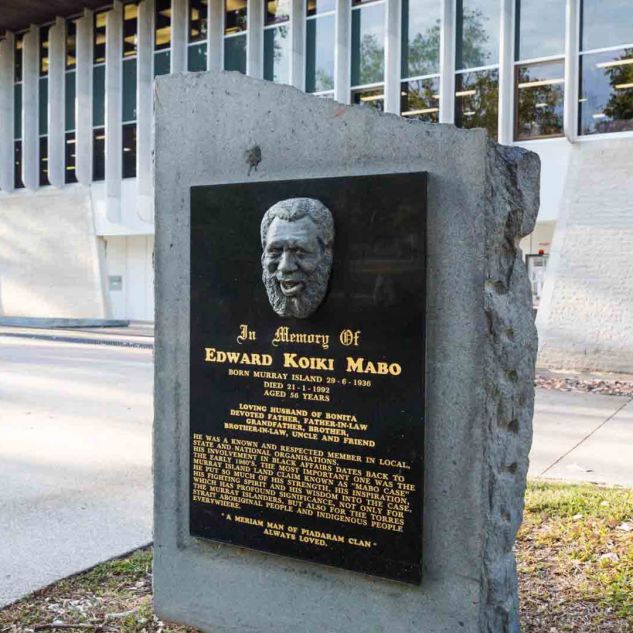College
College of Arts, Society and Education
Publish Date
3 June 2021
Related Study Areas
Eddie Mabo’s lifelong battle
Eddie Mabo’s pursuit of what would become the Native Title Act started at JCU Townsville with a conversation between himself and two friends, academics Henry Reynolds and Noel Loos. While his journey may have started at JCU, his own dedication and support from his family carried the case to the High Court decision on June 3, 1992.
That decision overturned the legal fiction of Terra Nullius (nobody’s land) acknowledging Aboriginal and Torres Strait Islanders as the first occupants of Australia. Beyond this, it acknowledges the cultural ties the First Peoples of the country have to land.
June 3 is annually recognised as Mabo Day and the impacts of that conversation and what followed are still widely felt. There are more than 100 Native Title claims across Australia, with even more cases currently before the country’s court system.
According to JCU Senior Lecturer at the Indigenous Education and Research Centre, Dr Vincent Backhaus, the events illustrate the power of an honest conversation.
“At the outset, we can see Mabo day, not only for us as staff, but students and members of the community, as a mirror on our institution of James Cook University,” Vincent says.
“Institutions around the country can use the day to reflect on the process of engagement with Aboriginal and Torres Strait Islander peoples.”
Mabo Day also represents an opportunity to reflect on, and take pride in, the progress that has been made to improve the lives of Aboriginal and Torres Strait Islander peoples.
“Staff, community, and, more importantly, the students who come to our universities can learn and think about the progress that we have made, not only here at JCU but in the wider community around Australia,” Vincent says.
Examples of this progress include the nation-wide ‘Closing the Gap’ program, which aims to reduce the inequalities between Indigenous Australians and non-Indigenous Australians.
While Eddie’s conversation with a pair of JCU academics may have started the process, it took further hard work and determination to see it through. Vincent believes the process must be diligently maintained.
“Going back to the very idea of Henry Reynolds and Noel Loos and Uncle Eddie Koiki Mabo having a conversation, engaging in that process of listening, I think that’s very much something we’re not mindful of at times,” he says.
“After hearing the story that Uncle Eddie Koiki Mabo shared, we moved on from that place of listening to a place of action, and subsequently we went through that process of questioning Jurisprudence and understanding the High Court decision.”
JCU Senior Lecturer Dr. Vincent Backhaus


A community effort
According to Vincent, this communication is far from a one-off event, but rather evidence of what can be accomplished when Australians work together.
“At every university in Australia, we’ve had Aboriginal and Torres Strait Islander peoples being part of the research, working as staff members and engaging in teaching and learning,” Vincent says.
“A mindset emerged and evolved out of JCU Townsville where Indigenous and non-Indigenous allies came together to think through some ideas that were impressed upon Aboriginal and Torres Strait Islander peoples at the time.
“Specifically, for Uncle Eddie Koiki Mabo his idea of the land was challenged and his connection to land was challenged. But action emerged out of a collaborative space of shared responsibility and shared accountability to move forward.”
The Mabo decision has had a profound impact on Australia as well as on individuals, including Vincent.
“I had the opportunity in 2009 to meet an anthropologist working on a native title claim for my peoples in the Mount Isa region,” he says.
“Through happenstance and presentations, we came together and we spoke and I was able to share my connection to country and my connection to land, which I had been tracing through government records and learning with family since childhood.
“Subsequently, he was able to not only help me but also the displaced and dispersed peoples of my Country living in different parts of Queensland who had been pushed off our traditional land through the colonial process.
“We were able to gain some sense of connection to Mount Isa, but more importantly celebrate the lives of our ancestral familial links and honour their presence on Country and connection to Country with community in the region.”
All of this from a simple conversation.
“Uncle Eddie Koiki Mabo’s legacy was present in my thinking,” Vincent says.
“If it wasn’t for him, his presence as a statesman of principled determination and perseverance and what he was able to push forward for the Meriam Mir people of the Torres Strait, I wouldn’t have been able to find courage, find significance to share my story with an anthropologist here in Cairns and progress that process to a native title determination in 2011 and 2012.”
Learn more about JCU Indigenous Education and Research Centre.